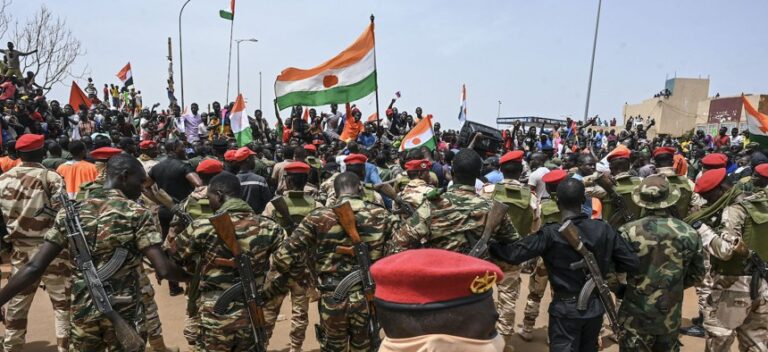Recent developments in Niger have raised eyebrows internationally as Russian troops have been deployed to an airbase in Niger where American soldiers are located. This move comes amidst tensions between Niger’s military rulers and the United States, further complicating the security dynamics in Africa’s Sahel region.
The Background
Niger, situated in Africa’s Sahel region, has been a focal point for international efforts to counter Islamic insurgents, particularly groups affiliated with the Islamic State. The United States has been heavily involved in this effort, relying on Niger as a primary base for monitoring jihadist activity in the region. However, tensions arose between the US and Niger’s military regime following the condemnation of last year’s coup, leading to strained relations.
In response to the deteriorating relationship with the US, Niger turned to Russia for assistance in combating Islamist insurgents, marking a significant shift in its foreign policy. The deployment of Russian troops to Airbase 101 in Niger’s capital, Niamey, underscores this shift and highlights the growing influence of Russia in the region.
The Deployment of Russian Troops
According to US officials, Russian forces have been stationed at Niger Airbase 101 in Niamey but are not directly interacting with American troops. The presence of Russian troops in close proximity to US forces raises concerns about the potential for friction, but Defense Secretary Lloyd Austin reassured that the Russians posed no immediate risk to US forces. He emphasized that the Russians are stationed in a separate compound and do not have access to US personnel or equipment.
The Russian troops deployed to Niger are reportedly military trainers, indicating a role in assisting Niger’s military in countering the insurgency in the country’s south. The exact number of Russian troops in Niger remains unclear, with earlier estimates suggesting around 60 troops. It is also uncertain how many American troops remain at Airbase 101, as most US forces in Niger are stationed at a drone base in Agadez, located approximately 750 kilometers northeast of Niamey.
US-Russia Relations and Regional Implications
The deployment of Russian troops to Niger comes amid deteriorating relations between the US and Russia, particularly following Russia’s invasion of Ukraine. Despite the tensions, analysts see no immediate prospect of confrontation between US and Russian troops in Niger. However, the presence of Russian forces in the region has broader implications for security and geopolitics.
Paul Melly, a West Africa analyst at Chatham House, suggests that Niger’s military leadership favors Russian assistance due to Russia’s lack of demands regarding governance and democratic rules. This contrasts with the US, which has attempted to link security assistance to Niger’s return to civilian rule. Melly highlights that the attraction of Russian support for the junta lies in its non-interference in domestic affairs.
Niger’s Shift in Foreign Policy
Niger’s decision to turn to Russia for assistance marks a significant shift in its foreign policy, away from its traditional reliance on Western powers. The strained relationship with the US following last year’s coup has pushed Niger towards seeking alternative allies. While the exact nature of Russian assistance remains unclear, the deployment of troops indicates a growing partnership between Niger and Russia in combating Islamist insurgents.
In March, Niger ordered all US troops to leave the country, accusing the US of objecting to Niger’s choice of allies. This move underscores Niger’s desire to assert its independence in foreign affairs and pursue partnerships that align with its interests. Additionally, other countries in the Sahel region, such as Chad, have also strengthened ties with Russia while distancing themselves from former colonial powers like France.
Regional Security Dynamics
The deployment of Russian troops to Niger reflects broader shifts in regional security dynamics, particularly in the Sahel region. With violent extremist organizations posing a significant threat to stability, countries in the region are seeking assistance from various international actors to combat insurgency and terrorism. The withdrawal of US troops from Chad ahead of elections further highlights the evolving security landscape in the Sahel.
Gen Michael Langley, head of the US Africa Command, emphasized the importance of continued engagement with countries in the region, even those led by military regimes. The goal, according to Gen Langley, is to encourage a return to democracy while addressing security challenges posed by extremist groups. However, recent developments suggest that some countries in the Sahel are prioritizing security partnerships over democratic governance, aligning with actors like Russia.
The Role of Russia in the Sahel
Russia’s increasing involvement in the Sahel region raises questions about its motives and long-term objectives. While Russia’s assistance may help countries like Niger in the short term, it also raises concerns about the consolidation of Russian influence in Africa. Unlike Western powers, Russia is less likely to prioritize issues such as governance and human rights, making it an attractive partner for some regimes in the region.
However, the extent to which Russian assistance will contribute to improving security in the Sahel remains uncertain. Critics argue that Russia’s primary goal may be to expand its geopolitical influence rather than address the root causes of instability in the region. Moreover, the lack of transparency surrounding Russian activities in Niger and other Sahel countries raises questions about the true nature of its engagement.
Conclusion
The deployment of Russian troops to Niger Airbase 101 marks a significant development in the security dynamics of the Sahel region. As Niger shifts its alliances away from traditional Western partners towards Russia, it underscores the complex geopolitical landscape in Africa. While the presence of Russian troops may provide temporary assistance in countering extremism, the long-term implications for regional stability and governance remain uncertain. As the Sahel continues to grapple with security challenges, international actors must navigate competing interests while prioritizing the well-being of the region’s populations.

